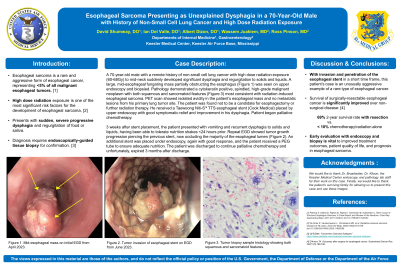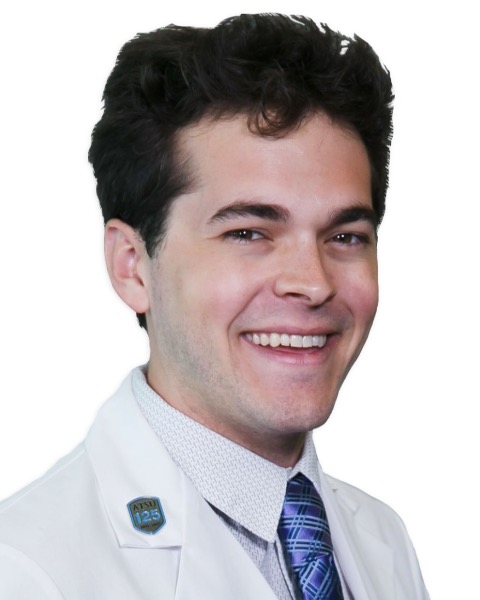Sunday Poster Session
Category: Esophagus
P0476 - Esophageal Sarcoma Presenting as Unexplained Dysphagia in a 70-Year-Old Male With History of Non-Small Cell Lung Cancer and High Dose Radiation Exposure
Sunday, October 22, 2023
3:30 PM - 7:00 PM PT
Location: Exhibit Hall

Has Audio

David O. Shumway, DO
United States Air Force
Biloxi, MS
Presenting Author(s)
David O. Shumway, DO, Ian Del Valle, DO, Albert Dizon, DO, Ross F. Pinson, MD
United States Air Force, Biloxi, MS
Introduction: Esophageal sarcoma is a rare and aggressive form of esophageal cancer, representing < 1% of all sarcomas. High dose radiation exposure is one of the most significant risk factors for the development of esophageal sarcoma, which can grow rapidly and readily invade surrounding tissue. Most patients present with sudden, severe, and unexplained progressive dysphagia and regurgitation of food or saliva. Diagnosis involves a combination of imaging tests such as CT and PET scans with endoscopically guided tissue biopsy for confirmation.
Case Description/Methods: A 70-year-old male with a remote history of left upper lobe non-small cell lung cancer treated with lobectomy, chemotherapy, and maximal dose radiation therapy, complicated by radiation-induced congestive heart failure, suddenly developed significant dysphagia and regurgitation to solids and liquids. Upper endoscopy was significant for a mid-esophageal fungating mass which was biopsied during the procedure. Pathology demonstrated a cytokeratin positive, spindled, high-grade malignant neoplasm with both squamous and sarcomatoid features. This was most consistent with new radiation-induced esophageal sarcoma, as a subsequent PET scan showed isolated avidity in the patient’s esophageal mass and no metastatic lesions from his primary lung tumor site. The patient was referred to surgical and radiation oncology and was found not to be a candidate for esophagectomy or further radiation therapy due to his high levels of previous exposure. He was started on chemotherapy and received a palliative esophageal stent placed by upper endoscopy.
Discussion: Early detection is vital for improved treatment outcomes in esophageal sarcoma as a multidisciplinary approach involving surgery, radiation therapy, and chemotherapy is required for management. Gastroenterology is a core component of this multidisciplinary team, crucial for diagnosing this rare, aggressive cancer via endoscopic biopsy, with additional roles in treatment both curative and palliative. This patient’s case is valuable to the gastroenterologist as a presentation of typical imaging and endoscopic findings of a severe and uncommon cause of dysphagia. Despite overall poor prognosis, survival of surgically-resectable sarcoma is significantly improved over non-surgical disease (69% 2-year survival rate with resection vs < 10% chemotherapy/radiation alone), necessitating further study to determine if surveillance is an option for early detection of this disease in high-risk populations.

Disclosures:
David O. Shumway, DO, Ian Del Valle, DO, Albert Dizon, DO, Ross F. Pinson, MD. P0476 - Esophageal Sarcoma Presenting as Unexplained Dysphagia in a 70-Year-Old Male With History of Non-Small Cell Lung Cancer and High Dose Radiation Exposure, ACG 2023 Annual Scientific Meeting Abstracts. Vancouver, BC, Canada: American College of Gastroenterology.
United States Air Force, Biloxi, MS
Introduction: Esophageal sarcoma is a rare and aggressive form of esophageal cancer, representing < 1% of all sarcomas. High dose radiation exposure is one of the most significant risk factors for the development of esophageal sarcoma, which can grow rapidly and readily invade surrounding tissue. Most patients present with sudden, severe, and unexplained progressive dysphagia and regurgitation of food or saliva. Diagnosis involves a combination of imaging tests such as CT and PET scans with endoscopically guided tissue biopsy for confirmation.
Case Description/Methods: A 70-year-old male with a remote history of left upper lobe non-small cell lung cancer treated with lobectomy, chemotherapy, and maximal dose radiation therapy, complicated by radiation-induced congestive heart failure, suddenly developed significant dysphagia and regurgitation to solids and liquids. Upper endoscopy was significant for a mid-esophageal fungating mass which was biopsied during the procedure. Pathology demonstrated a cytokeratin positive, spindled, high-grade malignant neoplasm with both squamous and sarcomatoid features. This was most consistent with new radiation-induced esophageal sarcoma, as a subsequent PET scan showed isolated avidity in the patient’s esophageal mass and no metastatic lesions from his primary lung tumor site. The patient was referred to surgical and radiation oncology and was found not to be a candidate for esophagectomy or further radiation therapy due to his high levels of previous exposure. He was started on chemotherapy and received a palliative esophageal stent placed by upper endoscopy.
Discussion: Early detection is vital for improved treatment outcomes in esophageal sarcoma as a multidisciplinary approach involving surgery, radiation therapy, and chemotherapy is required for management. Gastroenterology is a core component of this multidisciplinary team, crucial for diagnosing this rare, aggressive cancer via endoscopic biopsy, with additional roles in treatment both curative and palliative. This patient’s case is valuable to the gastroenterologist as a presentation of typical imaging and endoscopic findings of a severe and uncommon cause of dysphagia. Despite overall poor prognosis, survival of surgically-resectable sarcoma is significantly improved over non-surgical disease (69% 2-year survival rate with resection vs < 10% chemotherapy/radiation alone), necessitating further study to determine if surveillance is an option for early detection of this disease in high-risk populations.

Figure: Figure 1: Upper endoscopy images indicating mid-esophageal fungating mass found to be esophageal sarcoma
Disclosures:
David Shumway indicated no relevant financial relationships.
Ian Del Valle indicated no relevant financial relationships.
Albert Dizon indicated no relevant financial relationships.
Ross Pinson indicated no relevant financial relationships.
David O. Shumway, DO, Ian Del Valle, DO, Albert Dizon, DO, Ross F. Pinson, MD. P0476 - Esophageal Sarcoma Presenting as Unexplained Dysphagia in a 70-Year-Old Male With History of Non-Small Cell Lung Cancer and High Dose Radiation Exposure, ACG 2023 Annual Scientific Meeting Abstracts. Vancouver, BC, Canada: American College of Gastroenterology.

